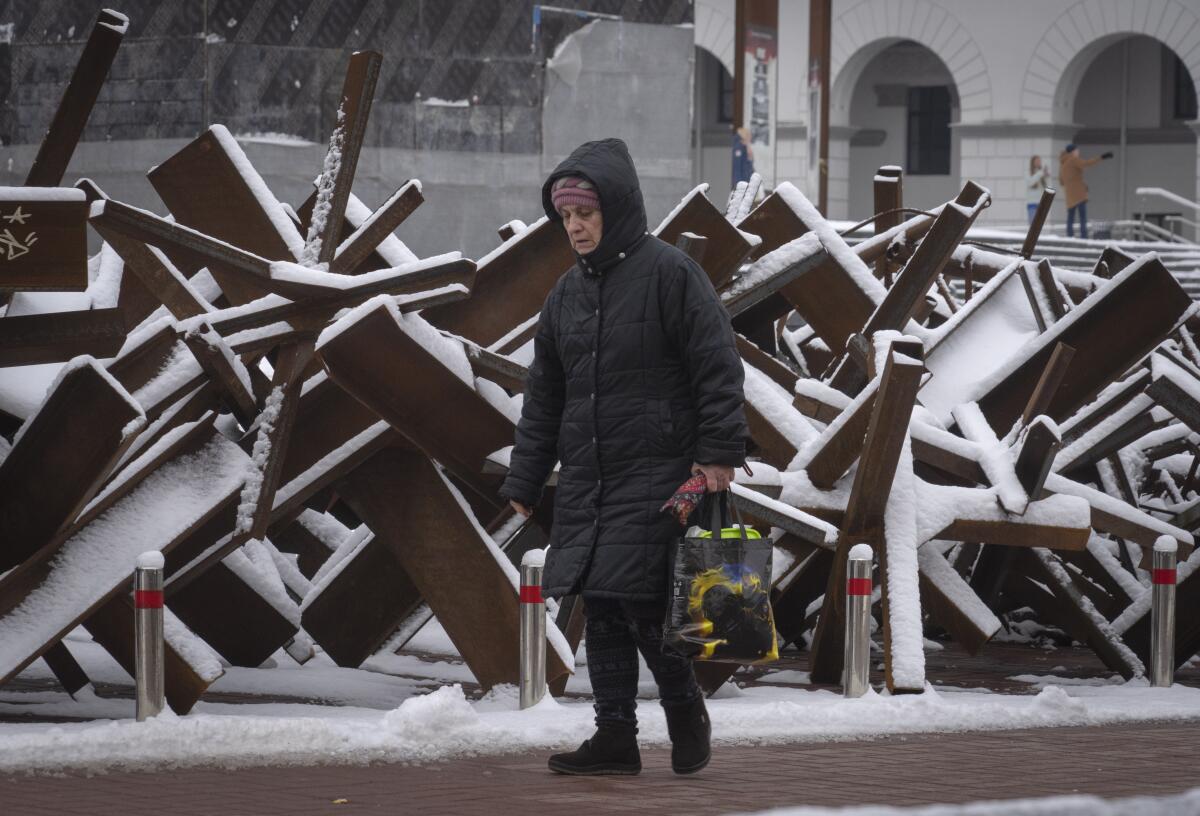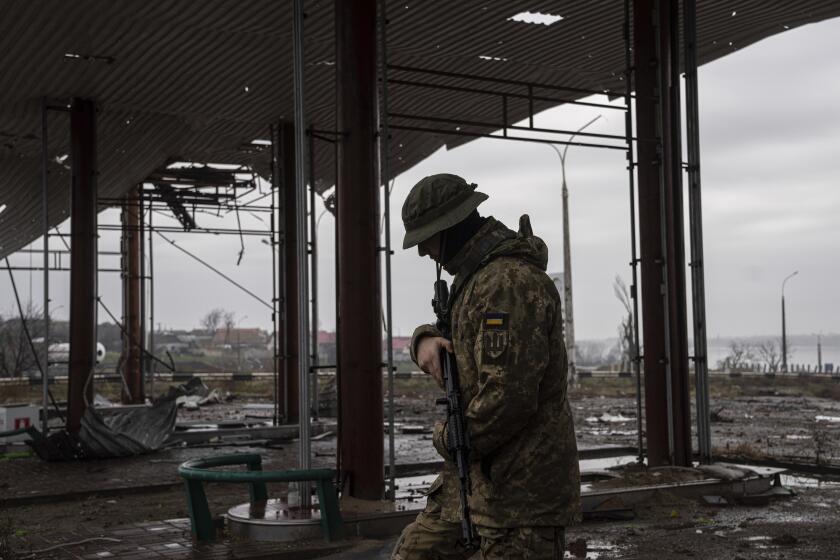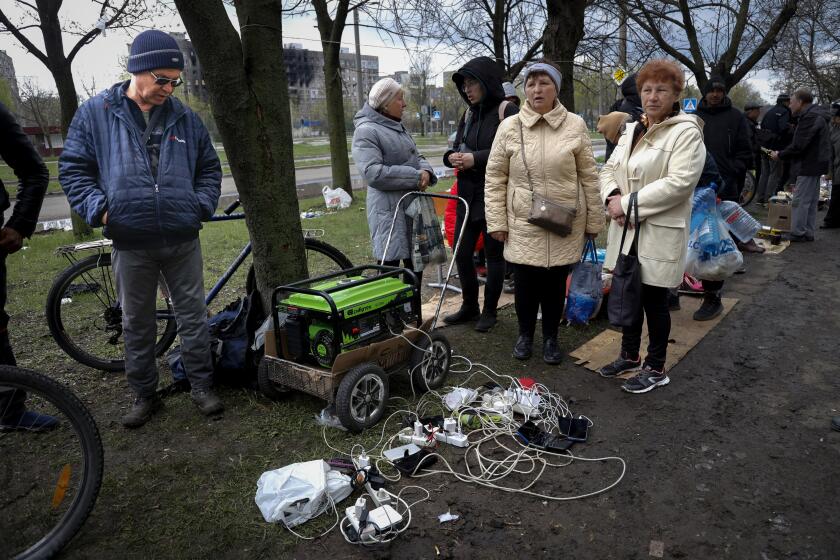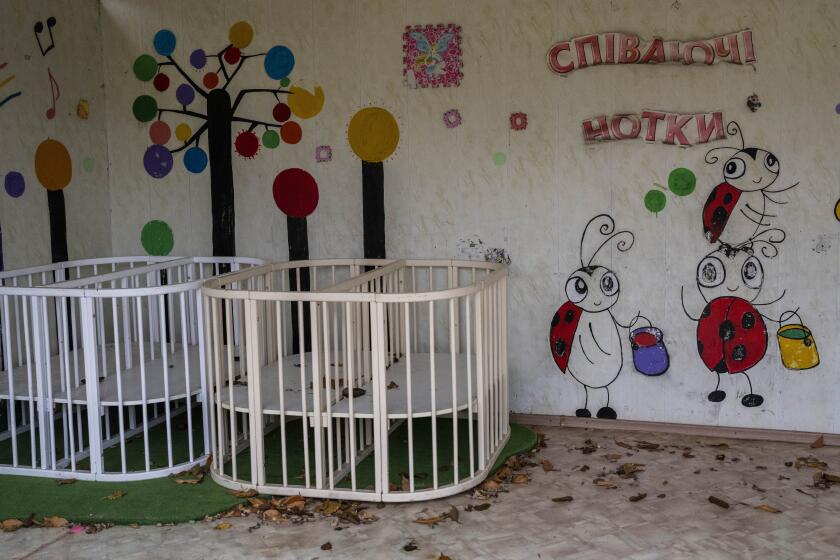Russian drones attack Kyiv as U.S. is poised to send Patriot missile system to Ukraine

- Share via
KYIV, Ukraine — Ukrainian authorities said they thwarted a Russian attack on Kyiv and the surrounding region Wednesday as their air-defense system intercepted and destroyed 13 explosives-laden drones, although wreckage from some of them damaged five buildings. No casualties were reported.
The attacks underline how vulnerable Ukraine’s capital remains to the regular Russian attacks that have devastated infrastructure and other population centers in recent weeks, mostly in the country’s east and south. But they also highlighted Ukraine’s claims of increasing efficiency in intercepting weapons — something that Patriot missiles from the U.S. may soon help boost.
U.S. officials said Tuesday that Washington was poised to approve sending a Patriot battery to Ukraine, agreeing to an urgent request from Ukrainian leaders desperate for more robust weapons to shoot down incoming Russian missiles.
The Russian Embassy in Washington said a Patriot missile system delivery would be “another provocative step by the administration, which could lead to unpredictable consequences.” It added that this would cause “colossal damage not only to Russian-American relations but would create additional global security risks.”
President Volodymyr Zelensky pressed Western leaders as recently as Monday to provide more advanced weapons to help his country. The Patriot would be the most advanced surface-to-air missile system the West has provided Ukraine to help repel Russian aerial attacks.
On Wednesday, Zelensky said in a brief video statement that Russian “terrorists” had launched 13 Iranian-made drones at Kyiv, and all were intercepted. Such drones have been part of Russia’s firepower along with mortar, artillery and rocket strikes across Ukraine in recent weeks.
The snow-covered capital remained largely calm after the attack, which occurred around daybreak. As the workday began, authorities sounded the all-clear.
The U.S. has refused to give Ukraine weapons that could be used to attack Russian territory. But Russia hasn’t hesitated to attack Ukrainian civilians.
The head of the Kyiv city administration, Serhiy Popko, wrote on the messaging app Telegram that the strikes came in two waves. Wreckage from the intercepted drones damaged one administrative building and four residential buildings, he said.
A blast left the three-story tax office building in the central Shevchenkivskyi district with a gaping hole in the roof and blew out windows in parked cars and in a neighboring building.
Cleanup crews were on site quickly to shovel away the rubble and roll out plastic sheeting to cover blown-out windows in freezing temperatures. One man, unfazed, pushed his son on a swing at a nearby playground as the crews did their work.
Anton Rudikov and his family were sleeping when they heard the sounds of an explosion nearby and shattering windows.
Millions of Ukrainians are without regular access to heat, electricity and water in frigid temperatures because of Russia’s attacks on infrastructure.
“The children were frightened; the windows flew out,” said Rudikov, who has daughters ages 13 and 18. “What else can I say?”
Residents said they saw fragments from a drone that bore the words “For Ryazan.” The Kremlin claims that Ukraine was responsible for an attack last week on a military base in the Ryazan region of western Russia.
Ukrainian authorities have trumpeted their ability to down Russian weapons. But strikes in some areas continue to cause deaths and havoc, particularly in places close to the front lines in the east and south. In the southern city of Odesa, drone strikes temporarily shut off the power last week. Kyiv has suffered comparatively little damage.
During a previous round of Russian volleys Dec. 5, more than 60 of 70 strikes were intercepted by air-defense systems, including 9 out of 10 targeting Kyiv and its region, Ukrainian officials have said.
Throughout the war, Moscow has been accused of seizing and deporting Ukrainian children to Russia or Russian-held territories to be raised there.
U.S. officials said last week that Moscow has been looking to Iran to resupply the Russian military with drones and surface-to-surface missiles.
The damage caused by Russian strikes has interrupted electricity, heating and water supplies to many Ukrainians as winter weather sets in. The United Nations migration agency said that more than 5 million people who were displaced within Ukraine or left the country since the Russian invasion started have returned home. The International Organization for Migration said a Nov. 25-Dec. 5 phone survey of 2,002 respondents in Ukraine also found that only 7% were considering leaving their current locations.
The head of Zelensky’s office, Andriy Yermak, said Wednesday that 64 Ukrainian soldiers and a U.S. citizen living in Ukraine were released in the latest prisoner swap between Kyiv and Moscow. In a Telegram post, he identified the “U.S. citizen who helped our people” as Suedi Murekezi. Yermak did not elaborate, and it was not immediately clear what, if any, role Murekezi had in Ukraine.
Separately, the International Atomic Energy Agency said that it had agreed with Ukraine to “establish a continuous presence of nuclear safety and security experts” at all of the country’s nuclear power plants as part of efforts to prevent a nuclear accident during the conflict.
The U.N. nuclear watchdog already has deployed a permanent expert mission to the Russian-held Zaporizhzhia nuclear power plant, Europe’s largest. The facility has faced repeated shelling and is the biggest cause of concern, although its six reactors have been shut down for some time.
There are three other plants in Ukrainian-held territory, as well as the decommissioned Chernobyl plant.
More to Read
Sign up for Essential California
The most important California stories and recommendations in your inbox every morning.
You may occasionally receive promotional content from the Los Angeles Times.













